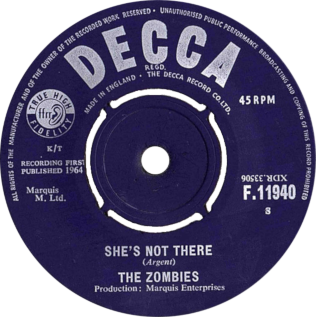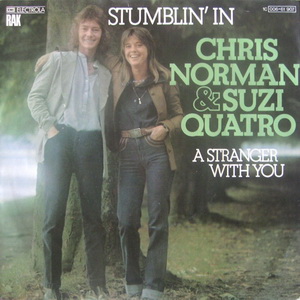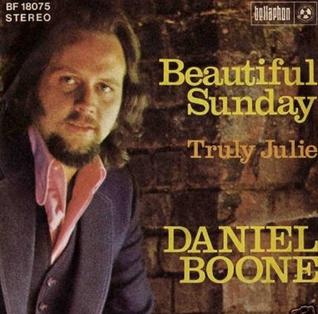Related Research Articles

"Sunshine Superman" is a song written and recorded by Scottish singer-songwriter Donovan. It was released as a single in the United States through Epic Records in July 1966, but due to a contractual dispute the United Kingdom release was delayed until December 1966, where it appeared on Donovan's previous label, Pye Records. The single was backed with "The Trip" on both the US and UK releases. It has been described as "[one of the] classics of the era", and as "the quintessential bright summer sing along".

"Hush" is a song written by American composer and musician Joe South, for recording artist Billy Joe Royal. The song was later covered by Somebody's Image in 1967. It reached #15. It was also covered by Deep Purple in 1968 and by Kula Shaker in 1997. Each artist had a Top 5 hit with their version.

"Angel of the Morning" is a popular song written by Chip Taylor, originally recorded by Evie Sands but which first charted with a version by Merrilee Rush. The song has been covered by many artists including Chrissie Hynde, Dusty Springfield P. P. Arnold, Connie Eaton, Mary Mason, Guys 'n' Dolls, Melba Montgomery, Olivia Newton-John and most recognizably by Juice Newton.
Gallery was an American soft rock band, formed in Detroit, Michigan by Jim Gold. While Gallery did record a number of songs, they are most famous for their 1972 hit single "Nice to Be with You", written by Gold. The song was arranged and produced by Dennis Coffey and Mike Theodore and released by Sussex Records. It became an international hit single, reaching the top five in the U.S., Canada, Australia, and New Zealand; sales of one million copies earned the band a gold record. The song reached No. 4 on the U.S. Billboard Hot 100 and remained in the Hot 100 for 22 weeks, tying with War's "Slippin' into Darkness" for most weeks on the chart during 1972. Billboard ranked it as the No. 14 song for 1972. "Nice to Be with You" reached No. 1 on Cashbox, WCFL, and WLS.

"I Can Hear Music" is a song written by Jeff Barry, Ellie Greenwich and Phil Spector for American girl group the Ronettes in 1966. This version spent one week on the Billboard Pop chart at number 100. In early 1969, the Beach Boys released a cover version as a single from their album 20/20 (1969), peaking at number 24 in the US.

"She's Not There" is the debut single by British rock band the Zombies, written by keyboardist Rod Argent. It reached No. 12 in the UK Singles Chart in September 1964, and No. 2 on the Billboard Hot 100 in the United States at the beginning of December 1964. In Canada, it reached No. 2.

"Soul Man" is a 1967 song written and composed by Isaac Hayes and David Porter, first successful as a number 2 hit single by Atlantic Records soul duo Sam & Dave, which consisted of Samuel "Sam" Moore and David "Dave" Prater. In 2019, "Soul Man" was selected for preservation in the National Recording Registry as "culturally, historically, and aesthetically significant" by the Library of Congress. It was No. 463 in "Top 500 Greatest Songs of All Time" by Rolling Stone Magazine in 2010 and No. 458 in 2004.
"One" is a song by American singer-songwriter Harry Nilsson from his 1968 album Aerial Ballet. It is known for its opening line "One is the loneliest number that you'll ever do". Nilsson wrote the song after calling someone and getting a busy signal. He stayed on the line listening to the "beep, beep, beep, beep..." tone, writing the song. The busy signal became the opening notes.

"Star Baby" is a 1974 hit song by The Guess Who. It was written by Burton Cummings who also provided the lead vocals. It is classified in the genre of Power pop and was included on the group's LP entitled, Road Food as well as The Guess Who – Greatest Hits in 1999 and The Guess Who - Anthology in 2003. The band performed the song on the Midnight Special television program on December 14, 1973.

"You Made Me Believe in Magic" is the title of a 1977 international hit single by the Bay City Rollers, taken from their album It's a Game. The recording, a mid-tempo disco-styled pop tune featuring strings and horns, had its greatest impact in North America, where it was issued as the album's lead single in May 1977 to reach number 10 on the US Hot 100 in Billboard magazine that August. "You Made Me Believe in Magic" was the Bay City Rollers' third US Top 10 hit; the follow-up single "The Way I Feel Tonight" (#25) would mark the group's final Hot 100 appearance.

"Stumblin' In" is a song written by Mike Chapman and Nicky Chinn, performed by Chris Norman and Suzi Quatro. Originally released as a standalone single, it was later added to some editions of the Quatro album If You Knew Suzi... It was Norman's first single as a solo artist.

"What's Your Name" is a rock song by Lynyrd Skynyrd, the opening track on their album Street Survivors. It peaked at No. 13 on the U.S. Billboard Hot 100 and No. 6 in Canada.

"This One's for You" is the title track from the 1976 album by Barry Manilow with words and music by Manilow and Marty Panzer. The song peaked at number 29 on the Billboard Hot 100, and at number one on the Easy Listening chart, reaching the top position for one week in November 1976, Manilow's fifth number one overall on that chart.

"Pushin' Too Hard", originally titled "You're Pushing Too Hard", is a song by American rock group The Seeds, written by vocalist Sky Saxon and produced by Saxon with Marcus Tybalt. It was released as a single in 1965, re-issued the following year, and peaked at number 36 on the Hot 100 in February 1967 and number 44 in Canada in March.

"Beautiful Sunday" is a song written by Daniel Boone and Rod McQueen and performed by Boone. It appeared on his 1972 album Beautiful Sunday and was produced by Larry Page and arranged by Boone.

"Nice to Be with You" is a 1972 song, from the album of the same name, by Gallery.

"Things I'd Like to Say" is a song by the American rock band New Colony Six, released in 1968 on their album Revelations and as a single. The song became a top 20 hit in the U.S., peaking at number 16 on the Billboard Hot 100 and at number 13 on the Cash Box Top 100 Singles chart, and a top 10 hit in Canada, peaking at number 6 on the RPM Top Singles chart. It also peaked at number 2 on the WLS 89 Hit Parade on 30 December 1968 in the band's home city of Chicago.
"Mr. Sun, Mr. Moon" is a song by the American rock band Paul Revere & the Raiders written by Mark Lindsay originally released as a single in 1969, then on the album Hard 'N' Heavy later that year. The song peaked at number 18 on the Billboard Hot 100, number 15 on the Cash Box Top 100 Singles chart, and at number 8 on the RPM Top Singles chart.

"The Other Guy" is a song by Australian soft rock band Little River Band. It was released in February 1983 as the third and final single from the band's 1982 Greatest Hits album. The song also introduced the band's new lead vocalist, John Farnham, who replaced Glenn Shorrock.

"Soul Deep" is a song originally recorded by Robbie Lane and the Disciples in 1966, but best known by a recorded version by The Box Tops. It was the third of three singles released from their 1969 Dimensions LP. Lead vocals were provided by Alex Chilton.
References
- ↑ "Steppenwolf singles".
- ↑ "BMI | Repertoire Search". repertoire.bmi.com.
- 1 2 "CashBox Record Reviews" (PDF). Cash Box. February 22, 1969. p. 24. Retrieved 2021-12-08.
- 1 2 "Steppenwolf Rock Me Chart History". Billboard .
- ↑ "WLS89 Hit Parade". WLS. 1969-04-07. Retrieved 2020-06-11.
- ↑ "1000 WCFL-AM Sound 10 Survey-Chicago". WCFL. 1969-06-09. Retrieved 2020-06-11.
- ↑ Hot 100, 1 March 1969
- ↑ "Cash Box Top Singles - 1969". www.tropicalglen.com.
- 1 2 Luft, Eric v d (21 September 2009). Die at the Right Time!: A Subjective Cultural History of the American Sixties. Gegensatz Press. ISBN 9781933237398 – via Google Books.
- ↑ "Rebel with a cause" (PDF). steppenwolf.com. Retrieved 2019-12-09.
- ↑ "1960's". steppenwolf.com.
- ↑ "Look Back: Radio Hits April 1969 - Best Classic Bands". 12 August 2015.
- ↑ "Candy [Original Soundtrack] - Steppenwolf - Songs, Reviews, Credits - AllMusic". AllMusic.
- ↑ "rock-me-live – steppenwolf – Music – 101.9 Jack FM – Playing What We Want – Fargo ND, Moorhead MN". 101.9 Jack FM. Midwest Communications.
- ↑ "Way Back Attack - Top 100 Psychedelic Hits 1966-1969". www.waybackattack.com.
- ↑ "CashBox Record Reviews" (PDF). Cash Box. February 15, 1969. p. 20. Retrieved 2021-12-08.
- ↑ Canada, Library and Archives (17 July 2013). "Image : RPM Weekly". Library and Archives Canada .
- ↑ "Top 100 Singles of 1969 in Canada". Canadian Music Blog. 14 February 2016.
- ↑ "Cash Box YE Pop Singles - 1969". www.tropicalglen.com.